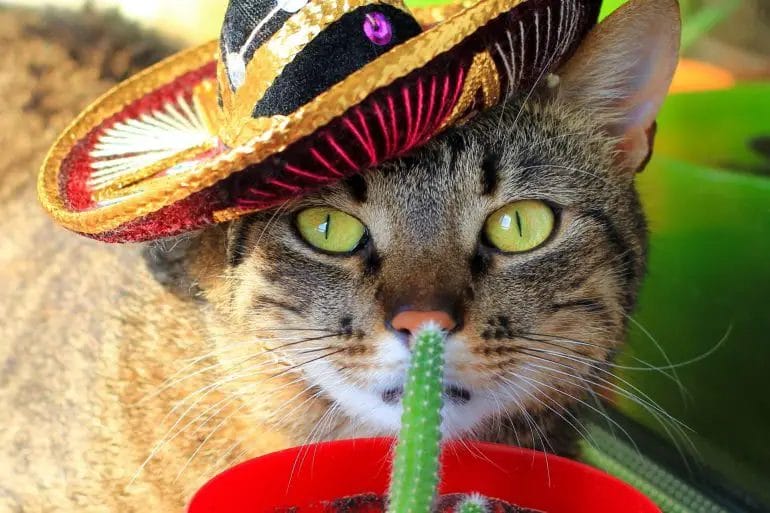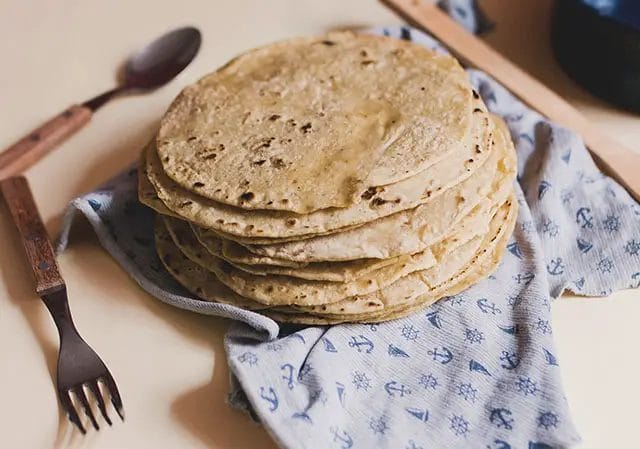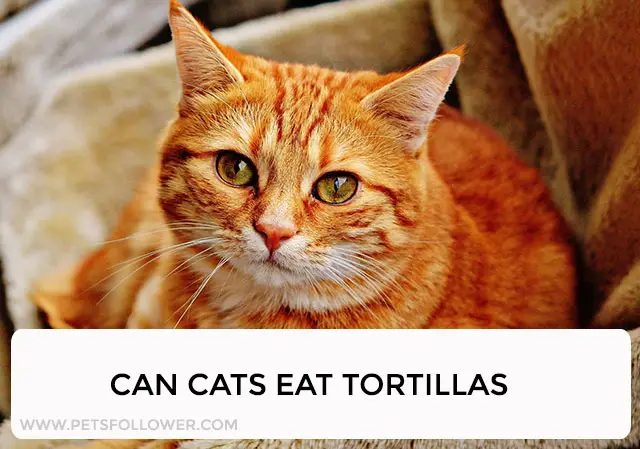Cats should not eat tortillas as they are not a part of their natural diet. Cats are obligate carnivores, meaning they require a diet primarily consisting of meat.
Tortillas are typically made from grains such as corn or wheat, which are not nutritionally beneficial for cats and can even cause digestive issues.
It is important to provide cats with a balanced diet that meets their nutritional needs, which can be achieved through specially formulated cat food.
If you have any concerns about your cat’s diet or health, it is always best to consult with a veterinarian for personalized advice and guidance.

Risks and potential dangers of feeding tortillas to cats
While cats are known for their curiosity and selective eating habits, it is important to be aware of the potential risks and dangers associated with feeding them certain foods. One such food that cat owners should approach with caution is tortillas. While tortillas may seem harmless, they can pose several risks to feline health.
1. Digestive issues:
Tortillas are made primarily from wheat flour, which contains gluten. Cats are obligate carnivores and are not designed to digest large amounts of carbohydrates like gluten. Feeding tortillas to cats can lead to digestive issues such as diarrhea, vomiting, and abdominal discomfort.
2. Weight gain and obesity:
Tortillas are high in calories and can contribute to weight gain and obesity in cats. This is particularly concerning as obesity can lead to a variety of health problems, including diabetes, joint issues, and heart disease. It is essential to maintain a balanced diet for cats to ensure they receive the necessary nutrients without excessive calorie intake.
3. Allergic reactions:
Some cats may be allergic to wheat or gluten, which are common ingredients in tortillas. Allergic reactions can manifest in various ways, including skin rashes, itching, hair loss, and gastrointestinal distress. If you notice any signs of an allergic reaction in your cat, it is crucial to consult a veterinarian.
4. Choking hazards:
Tortillas, particularly when dry and brittle, can present a choking hazard for cats. If a tortilla is not adequately chewed and broken down before swallowing, it can become lodged in the throat or cause an obstruction in the digestive tract. This can be a life-threatening emergency that requires immediate veterinary intervention.
5. Nutritional imbalances:
Cats have specific dietary needs that are different from those of humans. Tortillas lack many essential nutrients that cats require to thrive, such as taurine, an essential amino acid found in animal tissues. Feeding tortillas regularly can lead to nutritional imbalances and deficiencies, which can have long-term detrimental effects on a cat’s health.
In summary, while it may be tempting to share your tortilla snacks with your feline companion, it is best to avoid feeding tortillas to cats altogether. The risks and potential dangers, including digestive issues, weight gain, allergies, choking hazards, and nutritional imbalances, outweigh any potential benefits. Instead, stick to a balanced and species-appropriate diet for your cat, consisting of high-quality commercial cat food or vet-approved homemade meals. Always consult with a veterinarian regarding your cat’s specific dietary needs and any potential concerns you may have.

Alternatives to Tortillas for Cats’ Dietary Needs
When it comes to feeding our furry feline friends, we always strive to provide them with a healthy and well-balanced diet. While tortillas may be a tasty treat for us humans, they are not suitable for cats due to their nutritional composition. Tortillas are typically made from wheat flour, which can be difficult for cats to digest and may lead to digestive issues or allergies.
However, there are plenty of alternative options that can satisfy your cat’s dietary needs and cravings. Here are some healthy and cat-friendly alternatives to tortillas:
1. Cat-Specific Treats
Cat-specific treats are a great way to indulge your feline companion while ensuring they receive the necessary nutrients. Look for treats that are specifically formulated for cats, as they will contain essential vitamins and minerals. These treats come in various flavors and textures, so you can find something that your cat will truly enjoy.
2. Cooked Meat
One of the best alternatives to tortillas for cats is cooked meat. Cats are obligate carnivores, which means their bodies require a diet primarily consisting of meat. Cooked chicken, turkey, or lean beef can be provided to your cat as a special treat. Just make sure to remove all bones and skin, as they can be harmful to cats.
3. Canned Cat Food
Canned cat food is a convenient and nutritious option for your feline friend. It is specifically formulated to meet the nutritional needs of cats and often comes in a variety of flavors. Look for high-quality canned cat food that contains real meat as the primary ingredient and avoid brands that use fillers or artificial additives.
4. Raw Diet
Some pet owners choose to feed their cats a raw diet, which closely mimics what cats would eat in the wild. This diet typically consists of raw meat, organs, and bones. However, it is important to note that a raw diet requires careful planning to ensure your cat receives all the necessary nutrients. Consult with your veterinarian before transitioning your cat to a raw diet.
5. Dental Chews
Cats can benefit from dental chews, which not only help with dental hygiene but also serve as a tasty snack. Dental chews are designed to promote dental health by reducing plaque and tartar buildup. Look for dental chews that are specifically formulated for cats and approved by veterinarians.
6. Homemade Cat Treats
If you enjoy cooking, you can try making homemade cat treats using cat-friendly ingredients. There are plenty of recipes available online that use ingredients such as canned tuna, cooked chicken, or even pureed baby food. Just make sure to avoid using any harmful ingredients or seasonings that could be toxic to cats.
7. Fresh Vegetables
While cats are obligate carnivores, some vegetables can be a healthy addition to their diet in small quantities. Steamed or pureed vegetables such as pumpkin, carrots, or spinach can provide a boost of vitamins and fiber. However, always introduce new vegetables gradually and monitor your cat’s reaction to ensure they tolerate them well.
In summary, while tortillas may be a tasty treat for humans, they are not suitable for cats’ dietary needs. Instead, opt for cat-specific treats, cooked meat, canned cat food, a raw diet (with caution), dental chews, homemade cat treats, or small quantities of fresh vegetables to provide a well-rounded and nutritious diet for your feline companion.

Can cats eat corn tortillas or flour tortillas?
As a cat owner, you may wonder whether it is safe for your feline friend to consume tortillas. While cats are obligate carnivores and derive most of their nutritional needs from meat, they may occasionally display curiosity about human foods.
Corn Tortillas:
Corn tortillas are made from ground corn and water, making them a staple food in many cultures. While corn itself is not toxic to cats, it is important to consider a few factors before offering corn tortillas to your pet.
Firstly, corn tortillas are typically high in carbohydrates, which can be problematic for cats. Cats have a limited ability to digest carbohydrates, and a diet high in carbohydrates can lead to weight gain and potential health issues, such as diabetes. Therefore, it is best to avoid feeding corn tortillas to your cat as a regular part of their diet.
Secondly, corn tortillas often contain seasonings or toppings that can be harmful to cats. Ingredients like salt, spices, and flavorings can upset your cat’s digestive system or even be toxic. It is crucial to keep in mind that cats have different metabolic processes compared to humans, making certain seasonings harmful to them.
Flour Tortillas:
Flour tortillas are made from wheat flour, water, and sometimes additional ingredients such as salt or fat. While cats can tolerate small amounts of wheat in their diet, feeding them flour tortillas is not recommended.
Similar to corn tortillas, flour tortillas are high in carbohydrates and can potentially lead to weight gain and digestive issues in cats. Additionally, the seasonings or fillings often present in flour tortillas can be harmful to cats. It is important to remember that cats have sensitive digestive systems and may react negatively to certain ingredients.
Best Practices for Incorporating Tortillas into a Cat’s Diet
While tortillas can be a delicious and versatile staple in our own diets, it’s important to exercise caution when introducing them into a cat’s diet. Cats have specific dietary requirements that differ from our own, and it’s crucial to prioritize their health and well-being above all else. Below are some best practices to consider when incorporating tortillas into a cat’s diet:
1. Limited and Occasional Treats
Tortillas should only be given to cats as an occasional treat and should not be a regular part of their diet. A small piece of tortilla every now and then can provide a change of taste and texture, but it should not replace their primary food source.
2. Plain and Unseasoned
When giving tortillas to your cat, it’s important to offer them plain and unseasoned tortillas. Avoid toppings such as salt, spices, herbs, or any seasoning that may be harmful to cats. Plain tortillas are easier for cats to digest and minimize the risk of any digestive upset.
3. Portion Control
Cats have different nutritional needs than humans, and it’s crucial to pay attention to portion control. Offer only small, bite-sized pieces of tortillas to prevent overeating and weight gain. Remember that treats should only make up a small portion of a cat’s overall diet.
4. Monitor for Allergies or Sensitivities
Just like humans, cats can develop allergies or sensitivities to certain foods. When introducing tortillas to your cat for the first time, closely monitor their reaction. Look out for any signs of digestive upset, such as vomiting or diarrhea, and discontinue feeding tortillas if any adverse reactions occur.
5. Consider Nutritional Balance
Tortillas should never replace a nutritionally balanced cat food. Cats require specific nutrients, such as taurine, which are essential for their overall health. Tortillas lack these essential nutrients and can lead to nutritional imbalances if provided as a significant portion of their diet.
In summary, while it may be tempting to share your love for tortillas with your feline friend, it’s important to remember that their dietary needs should always come first. Treats like tortillas should only be given sparingly, in plain and unseasoned form, and as small portions to avoid any potential health issues. Always keep an eye out for any adverse reactions and consult your veterinarian if you have any concerns about your cat’s diet.
Can cats eat tortillas?
Cats should not eat tortillas as they are made from wheat flour, which cats cannot digest properly. Additionally, tortillas often contain seasonings or ingredients that can be harmful to cats, such as onions or garlic. It is best to stick to a balanced and appropriate diet specifically formulated for cats.
Conclusion
In conclusion, cats should not be fed tortillas. While cats may be curious about human food, tortillas are not a suitable or nutritious option for them. Cats are obligate carnivores and require a diet primarily made up of animal protein.
Tortillas are high in carbohydrates and can lead to weight gain and digestive issues in cats. Additionally, tortillas often contain ingredients like garlic and onions, which are toxic to cats. It is best to stick to a balanced and species-appropriate diet for your feline friend, consisting of high-quality cat food formulated to meet their nutritional needs.
Remember to always consult with your veterinarian before introducing any new foods into your cat’s diet to ensure their health and well-being.
